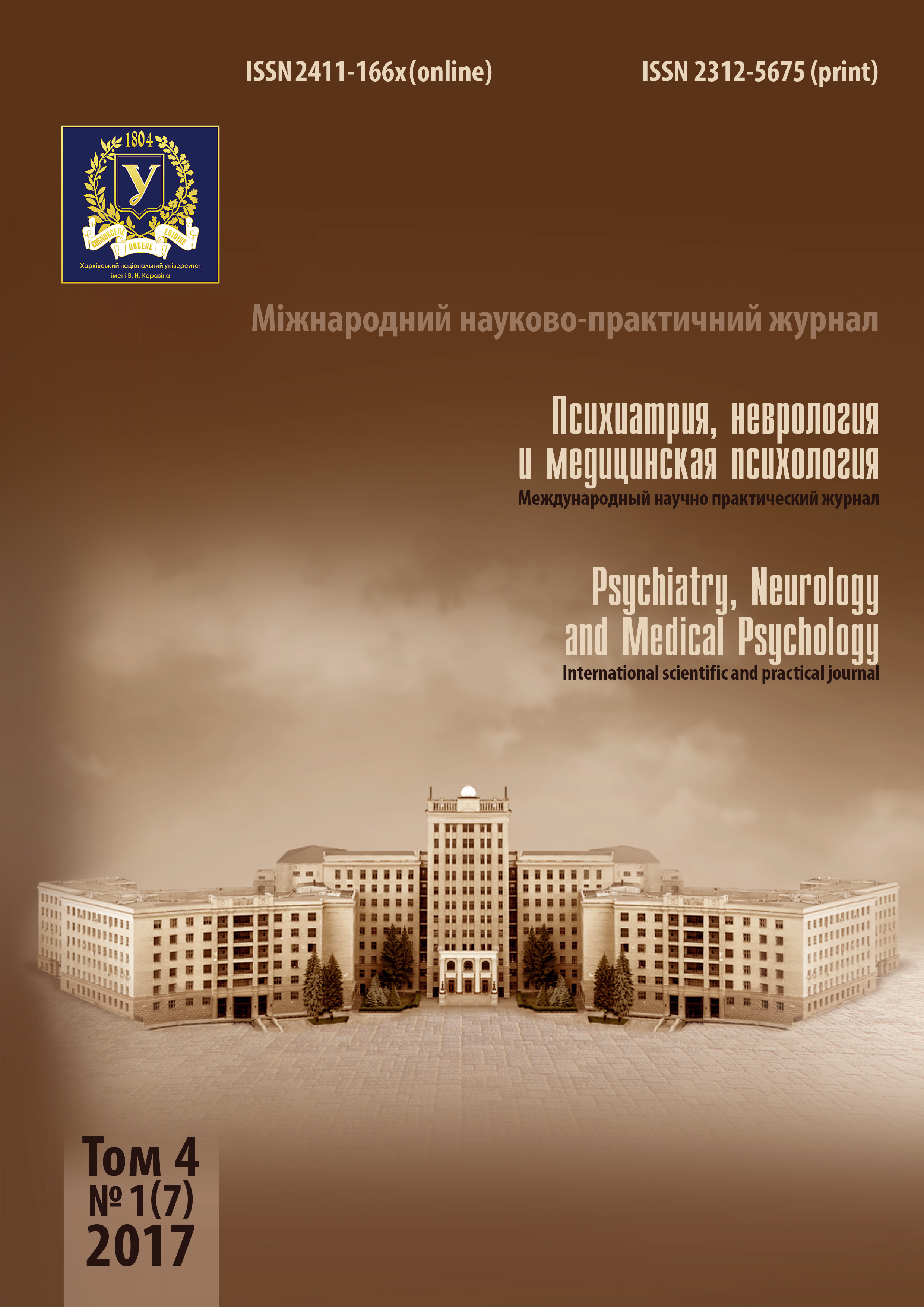Clinical-Anamnestic And Premorbid Pathpersonological Characteristics Of Patients Suffering From Organic Defeat And Anxiety-Depressive Disorders With Poor Therapy Compliance
Abstract
The study is aimed at identifying the mental response characteristics of patients preceding the organic lesion of the central nervous system. The concept of the study is to determine the role of personal factors in the organic anxiety- depressive disorders psychopathogenesis. In order to establish clinical-anamnestic and premorbid pathopersonological features of patients with organic anxiety-depressive disorders, 102 patients were examined using the Leongard– Shmishek questionnaire and L. N. Sobchik’s individual-typological questionnaire. The results of the study revealed anamnestic correlates and pathopersonological characteristics of patients with organic anxiety-depressive disorders. The following premorbid pathopersonological features of patients have been established: instability of the affective and motivational spheres of the personality, emotional tension, internal personality conflict, pathological mistrust and fearfulness towards others and a tendency to obsessional phobic reactions
Downloads
References
Бурчинский С. Г. Депрессивные расстройства в неврологической практике: возможности ноотропов нового поколения / С. Г. Бурчинский // Здоровье Украины. – 2009. – No 15–16 (220–221). – С. 46–47.
Терегулова Д. Р. Депрессия в неврологической практике (на примере болевых синдромов и инсульта) / Д. Р. Терегулова, М. А. Кутлубаев, Л. Р. Ахмадеева // Вестник современной клинической медицины. – 2015. – No 3. – С. 32–36.
Göthe F. Cerebrovascular diseases and depres-sion: epidemiology, mechanisms and treatment / F. Göthe, D. Enache, L. O. Wahlund [et al.] // Panminerva medica Journal. – 2012. – No 54 (3). – P. 161–170.
Аймедов К. В. Тривога під маскою депресії / К. В. Аймедов, К. В. Грибовська // Науковий потенціал молоді – прогрес медицини майбутнього : матер. наук.-практ. конф. з міжнародн. уч. – Ужгород. – 2012. – С. 63.
Meroni R. Psychiatric disorders in patients suffering from an acute cerebrovascular accident or traumatic injury, and their effects on rehabilitation: an observational study / R. Meroni, E. Beghi, M. Beghi [et al.] // European Journal of Physical and Rehabilitation Medicine. – 2013. – No 49 (1). – Р. 31–39.
Ахмедова Д. А. Особенности постинсультной депрессии в раннем и позднем восстановительном периодах / Д. А. Ахмедова, С. З. Хакимова, А. Т. Джурабекова // Инновационная наука. – 2015. – No 6–2. – С. 224–227.
Schöttke H. Post-stroke depression and post-stroke anxiety: prevalence and predictors / H. Schöttke, C. M. Giabbiconi // International Psychogeriatrics Journal. – 2015. – No 27 (11). – P. 54–61.
Zaninotto A. L. Updates and Current Perspectives of Psychiatric Assessments after Traumatic Brain Injury: A Systematic Review / A. L. Zaninotto, J. E. Vicentini, F. Fregni [et al.] // Frontiers in Psychiatry. – 2016. – No 7. – P. 95.
Коростій В. И. Анксиолитические препараты в комплексной терапии тревожных расстройств при психосоматических заболеваниях / В. И. Коростій, А. М. Кожина // НейроNEWS. – 2012. – No8 (43). – С. 21–25.
Коростій В. І. Лікування психічних розладів тривожно-депресивного спектру серед хворих на психосоматичні розлади / В. І. Коростій // Інтегративні підходи в діагностиці та лікуванні психічних і психосоматичних хвороб : матер. наук.-практ. міжре-гіон. конф. – Вінниця. – 2010. – С. 52.
Старчина Ю. А. Постинсультная депрессия: научно-обоснованные подходы к выбору терапии / Ю. А. Старчина // Неврология, нейропсихиатрия, психосоматика. – 2012. – No 1. – С. 116–120.
Sibolt G. Post-stroke depression and depression-executive dysfunction syndrome are associated with recurrence of ischaemic stroke / G. Sibolt, S. Cur-tze, S. Melkas [et al.] // Cerebrovascular Diseases Jour-nal. – 2013. – No 36 (5–6). – P. 336–343.
Copyright (c) 2017 Наталя Віталіївна Криванкова

This work is licensed under a Creative Commons Attribution 4.0 International License.

